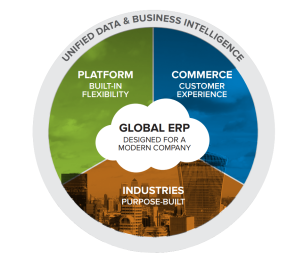 SuiteWorld 2019, which wrapped up last week, provided 7,500 attendees with an update on NetSuite’s progress and a glimpse into its plans for the future.
SuiteWorld 2019, which wrapped up last week, provided 7,500 attendees with an update on NetSuite’s progress and a glimpse into its plans for the future.
Founded in 1998 as NetLedger, NetSuite has been a pioneer in the cloud applications—aka software-as-a-service—market from the get-go. Three years ago, when Oracle acquired NetSuite, some wondered if and how well the $9.3 billion investment would work out for NetSuite.
Oracle Cash Infusion Accelerates NetSuite Growth and Development
Judging from the numbers, it looks like things are working out pretty well.
Oracle has been investing to increase NetSuite headcount and to develop new and enhanced products. These investments have enabled NetSuite to significantly expand its international presence. The company now has offices in 212 countries and territories, and has added 21 new country localizations. Overall, NetSuite has added more than 3,500 new customers in its FY2019, growing its installed base to over 16,500 accounts
Oracle’s cash infusion has helped NetSuite to pursue its vertically-focused “land and expand” strategy much more aggressively. Since the acquisition, NetSuite has introduced 28 new vertical SuiteSuccess editions to the market. SuiteSuccess is designed to give customers an easier, faster on-ramp to NetSuite—which is particularly important for small business customers migrating from entry-level accounting solutions to ERP.
 But SuiteSuccess has enjoyed much broader appeal: 96% of new customers now use SuiteSuccess as their on-ramp to NetSuite. In addition, NetSuite claims that SuiteSuccess has helped it to shorten the sales cycle to an average of 35 days. The vendor has also used this strategy to build a dominant position in technology IPO sector, asserting that it wins in 60% of these deals.
But SuiteSuccess has enjoyed much broader appeal: 96% of new customers now use SuiteSuccess as their on-ramp to NetSuite. In addition, NetSuite claims that SuiteSuccess has helped it to shorten the sales cycle to an average of 35 days. The vendor has also used this strategy to build a dominant position in technology IPO sector, asserting that it wins in 60% of these deals.
NetSuite is taking advantage of Oracle technology investments in areas such as artificial intelligence (AI) and machine learning (ML) as well. For instance, NetSuite plans to introduce a Supply Chain Control Tower feature later this year that will use AI and ML to predict orders that are going to be late, and recommend remedial actions.
NetSuite customers are also set to reap security, performance and labor benefits provided by the Oracle Cloud Infrastructure (OCI) and Oracle Autonomous database, which are expected to roll out for NetSuite this June. Once migrated, this should give OCI, which has lagged behind Amazon AWS and Microsoft Azure in the cloud infrastructure market, convincing evidence to establish its case as a strong platform for cloud ISVs.
In addition, Oracle investments are helping NetSuite to strengthen its services team and portfolio. Its Customer Success organization has grown significantly over the past 3 years and now provides services from 28 offices in 11 countries. Services employees are compensated on customer retention and satisfaction, not on hourly billing. The vendor has introduced an Advanced Support option, primarily for larger companies with more complex operations, to provide more proactive advisory, monitoring, optimization and architecture services, and launched a 24/7 online Learning Cloud subscription service for NetSuite training.
NetSuite also announced Brainyard, a new business research and bench marking service. Based on insights from its SuiteSuccess configurations, value management and product teams, and solution consultants, Brainyard offers customers quick, easy access to research, data and practical advice needed to grow and run a business.
Grow Beyond: Expanding Beyond Financials and ERP
“Grow Beyond” was the theme for SuiteWorld 2019, reflecting NetSuite’s desire to “unlock the power of the suite.”
While NetSuite’s integrated platform includes a comprehensive suite of applications, customer uptake for CRM, HR, payroll, project management and applications for other functional areas has been slower than the adoption rate for financials and ERP. Many users choose to stick with solutions that they already use, or look for a “best of breed” solution to satisfy their requirements for these functions.
 NetSuite’s goal is to convince people that the whole is greater than the sum of its parts. In other words, by using an integrated suite of applications, all running on one database, NetSuite can deliver better visibility, more efficiencies, and streamlined workflow that will more than make up for feature benefits of best of breed—but disconnected—solutions.
NetSuite’s goal is to convince people that the whole is greater than the sum of its parts. In other words, by using an integrated suite of applications, all running on one database, NetSuite can deliver better visibility, more efficiencies, and streamlined workflow that will more than make up for feature benefits of best of breed—but disconnected—solutions.
Of course, NetSuite been promoting the benefits of an integrated suite as a cure for the tangle of disconnected business software “hairballs” for years. NetSuite intends to build on this by ramping up efforts to showcase how, by using use more of the Suite, customers can gain more a more comprehensive view of their businesses that will help them to grow faster than peers that take a disconnected applications approach.
To further encourage customers to expand their NetSuite footprint, the vendor announced that it is offering NetSuite customers that use rival Adaptive Planning (recently acquired by Workday) a free one-year subscription to SuiteSuccess Planning and Budgeting, due to launch in June.
Perspective
It’s never easy to predict how tech acquisitions will work out. But so far, this one reads like a textbook case of what went right.
The stars were aligned well from the start, as NetSuite and Oracle have had a close relationship since NetSuite’s inception. Oracle founder Larry Ellison poured nearly $100 million into NetSuite back in 1998 when NetSuite was founded by Evan Goldberg, who had spent eight years at Oracle prior to launching NetSuite. NetSuite developed its solutions on Oracle’s database from the outset, and was even briefly branded as Oracle Small Business Suite back in 2001.
These technological and cultural synergies helped set the scene for a positive outcome in a very substantial way.
As important, while Oracle has made significant investments to help NetSuite grow, it appears that it has also given NetSuite the independence necessary to make the best choices for its predominately SMB customers. Oracle has also taken steps to mitigate potential conflicts between sales teams by letting customer requirements guide the sale, and compensating both NetSuite and Oracle sales reps, regardless of which of these two solutions the customer eventually buys.
As a result, NetSuite has grown faster than it could have on its own. Oracle’s backing and infrastructure support have enabled NetSuite to double down on vertical capabilities and international expansion—both now and likely well into the future.
Will NetSuite be able to achieve the same results as it turns to its next goal—persuading customers to “unlock the power of the suite” and use more NetSuite applications?
Logically, it should. The benefits of using a pre-integrated suite not only “look good on paper,” but make sense from a corporate-wide point of view. However, convincing different line-of-business stakeholders to cede turf for the promise of a higher good isn’t an easy sell.
NetSuite accounts that already rely heavily on incumbent CRM, HR or other solutions will likely demand more from NetSuite’s offerings in these areas than NetSuite can currently provide—and will continue to rely on integration vendors to make the necessary connections.
NetSuite’s smaller financials and ERP customers are probably the vendor’s best immediate target. Many of these companies still using spreadsheets, email and/or low-end solutions for these other functions, and may not have dedicated teams and managers to support them. These customers are likely to be receptive if NetSuite can provide an easy, low-friction on-ramp and evidence that it can provide fast time to positive outcomes to their most immediate concerns in a given functional area.
Source: Laurie McCabe’s Blog
